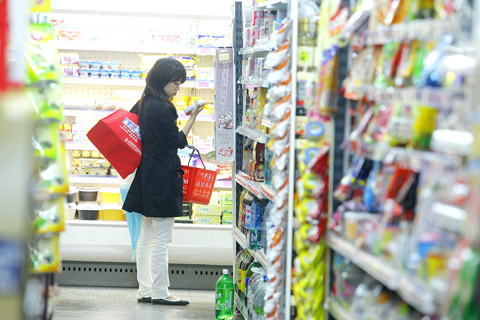The nation’s consumer price index (CPI) dropped 0.86 percent last month from last year on weak demand amid the economic downturn, the Directorate-General of Budget, Accounting and Statistics (DGBAS) said yesterday.
The statistics agency also published a series of living cost indexes for the first time, showing that prices for food and other necessities were slightly higher than their average prices last month.
“Commodity prices continued to drop compared with last year because of a poor economic climate, though the price of fruits and vegetables has remained stable,” DGBAS section chief Wu Chao-ming (吳昭明) told a media briefing.

PHOTO: CNA
This was the eighth straight month the headline inflationary gauge contracted as the recession slowed economic activity and retailers lowered prices to boost consumption, the latest CPI data showed.
Transportation prices reported the biggest fall, at 4.03 percent, as energy costs remained relatively high in September last year after crude oil hit US$147 a barrel in July last year. Wu said the swine flu pandemic contributed to shrinking transportation costs as people cut down on travel.
Household living costs saw a 1.93 percent decline, mostly on lower utility rates compared with last year, while entertainment and education costs dropped 2.79 percent on price cuts by retailers, the report said.
The core CPI, used to forecast long-term inflation trends by excluding energy, vegetable and volatile-priced commodities, dropped 0.93 percent, the fourth monthly contraction, the report said.
The figure is likely to stay in negative territory for the rest of the year, although GDP is expected to regain positive cyclical movements this quarter on improving economic signs.
The wholesale price index declined 9.59 percent year-on-year last month as global prices for metals, chemical and oil products dropped, the report showed.
Meanwhile, the DGBAS released its first living cost indexes in line with Premier Wu Den-yih’s (吳敦義) concept of a grassroots economy.
The first category index, under which food costs carry a weight of 80 percent, stood at 109.12 points last month.
This was higher than the CPI index of 104.24 points, although it dropped 0.55 percent from last year, the report said.
The second category index, which combines food costs with education and entertainment prices, reached 106.39 points and dipped a yearly 1.26 percent, the report said.
The third category, comprised of 239 commodity items usually purchased once a quarter or sensitive to price fluctuations, retreated 0.72 percent annually to 107.08 points, the report said.
The statistics official said the living cost indexes could establish better links between commodity data and the daily life of the common people, who may not buy certain goods and services despite price cuts.
Separately, major domestic hypermarket chains Carrefour Taiwan (家樂福), Far Eastern Geant Co (愛買) and Wellcome Supermarket (頂好超市) said vegetable and fruit prices remained virtually unchanged as of yesterday, with many customers going grocery shopping prior to the weekend’s Moon Festival.
The Council of Agriculture said in a press statement yesterday that heavy rain in northeastern Taiwan brought by Tropical Storm Parma had had a limited impact on vegetable and fruit supplies as most farmland is located in the south.

RUN IT BACK: A succesful first project working with hyperscalers to design chips encouraged MediaTek to start a second project, aiming to hit stride in 2028 MediaTek Inc (聯發科), the world’s biggest smartphone chip supplier, yesterday said it is engaging a second hyperscaler to help design artificial intelligence (AI) accelerators used in data centers following a similar project expected to generate revenue streams soon. The first AI accelerator project is to bring in US$1 billion revenue next year and several billion US dollars more in 2027, MediaTek chief executive officer Rick Tsai (蔡力行) told a virtual investor conference yesterday. The second AI accelerator project is expected to contribute to revenue beginning in 2028, Tsai said. MediaTek yesterday raised its revenue forecast for the global AI accelerator used

TEMPORARY TRUCE: China has made concessions to ease rare earth trade controls, among others, while Washington holds fire on a 100% tariff on all Chinese goods China is effectively suspending implementation of additional export controls on rare earth metals and terminating investigations targeting US companies in the semiconductor supply chain, the White House announced. The White House on Saturday issued a fact sheet outlining some details of the trade pact agreed to earlier in the week by US President Donald Trump and Chinese President Xi Jinping (習近平) that aimed to ease tensions between the world’s two largest economies. Under the deal, China is to issue general licenses valid for exports of rare earths, gallium, germanium, antimony and graphite “for the benefit of US end users and their suppliers

Dutch chipmaker Nexperia BV’s China unit yesterday said that it had established sufficient inventories of finished goods and works-in-progress, and that its supply chain remained secure and stable after its parent halted wafer supplies. The Dutch company suspended supplies of wafers to its Chinese assembly plant a week ago, calling it “a direct consequence of the local management’s recent failure to comply with the agreed contractual payment terms,” Reuters reported on Friday last week. Its China unit called Nexperia’s suspension “unilateral” and “extremely irresponsible,” adding that the Dutch parent’s claim about contractual payment was “misleading and highly deceptive,” according to a statement

Artificial intelligence (AI) giant Nvidia Corp’s most advanced chips would be reserved for US companies and kept out of China and other countries, US President Donald Trump said. During an interview that aired on Sunday on CBS’ 60 Minutes program and in comments to reporters aboard Air Force One, Trump said only US customers should have access to the top-end Blackwell chips offered by Nvidia, the world’s most valuable company by market capitalization. “The most advanced, we will not let anybody have them other than the United States,” he told CBS, echoing remarks made earlier to reporters as he returned to Washington